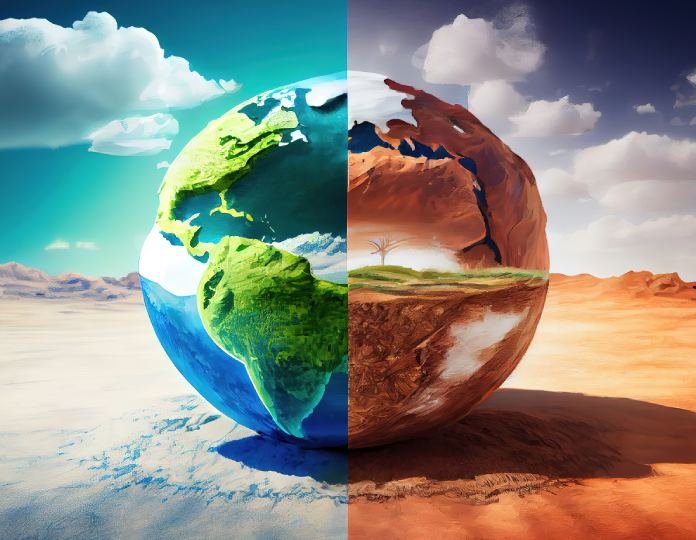With consequences ranging from excessive weather events and constant rising sea levels to biodiversity loss and resource scarcity, climate change has emerged as one of the biggest threats to humanity. People are becoming more anxious day by day about climate change due to the psychological impact it has on the surroundings. This is called eco-anxiety. Eco-anxiety is a new form of anxiety that has equally held people’s hearts and minds globally when it comes to environmental concerns. Eco-anxiety, which is characterized as chronic anxiety about environmental disasters and an excessive feeling of powerlessness when it comes to weather exchange, is a growing mental phenomenon that calls for our attention.
Although solastalism is not a new term, it is closely related to eco-anxiety, which was first mentioned in the medical journal Lancet in 2015 as a term relating to the effects of climate change on human well-being. The Australian philosopher Glenn Albrecht coined the term “solastalgia,” which is also not regarded as a sickness. It describes a group of psychological diseases that arise in local people after damaging changes in their territory, whether as a result of climatic or human activity.
Is eco-anxiety a mental illness?
Eco-anxiety makes sense. Our ‘internal alarm bells’ are alerting us to the problem. It makes perfect sense to respond in this way to the prospect of a sixth global extinction event. Although mental health professionals acknowledge that climate change might elicit a psychological reaction, they do not view climate anxiety as a diagnosable disorder. Although the long-term ramifications of this worry are unknown, they could contribute to the numerous ways that climate change affects human health.
Also Read: The Impact of the Industrial Revolution on Mental Health
The Causes of Eco-Anxiety
Development projects and Media Coverage:
Intensifying climate, biodiversity loss, and rising global temperatures are only a few of the horrifying climate projections that show how intense weather exchange is turning. Outlets related to climate, and trade, like hurricanes, floods, and wildfires, result in an increase in environmental anxiety. News tales and visuals also increase the sense of urgency and worry about surrounding climate change.
Environmental Degradation and Future Uncertainty:

Observing the deterioration of natural habitats, such as melting glaciers, dying coral reefs, and deforestation, can cause eco-anxiety. These visual clues serve as sharp reminders of how weather exchange affects everything. Eco-anxiety can be significantly increased by fears about the long-term future and the welfare of coming generations. It might be very difficult to consider that we will be leaving our children and grandkids with a damaged earth.
Effects of Eco-Anxiety
In fact, it tends to be more common among people who are more aware of the protection of the environment. The symptoms include the following: slight cases of anxiety, stress, sleep disturbances, nervousness, etc. In the more serious cases, eco-anxiety can cause a sensation of suffocation or even depression.
Mental health and Physical health:
It can lead one to experience symptoms such as stress, depression, and anxiety disorder. One may struggle with the constant worry that impacts their overall mental health. It can lead one to experience issues with their physical fitness like fatigue, complications, disturbed sleep, or insomnia. This can further increase the chances of the development of chronic fatigue.
Paralysis and Apathy Problems in Relationships:
Some people feel defeated and they react to the situation by being unable to act or make any definite decisions, which is known as paralysis and apathy. Eco-anxiety can stress, relationships, specifically when family participants or friends have differing views on climate change. The emotional weight of eco-anxiety can result in conflicts and emotional distance.
Experience Guilt:
People with eco-anxiety can also sense guilt leading to an experience of moral and ethical obligation to make more sustainable choices.
How to deal with climate anxiety
Eco-anxiety is a reasonable reaction to the status of the planet today, but it is crucial to remember that, just like other anxieties and emotions, concerns about the environment should be handled carefully.
1. Don’t bury your feelings and Speak up:
Take some time to write down every thought that comes to mind regarding the climate problem, and then determine the feelings that underlie each one. Force of Nature hosted a number of Climate Cafés at the Museum in November 2022 to promote candid conversation on attitudes toward the climate catastrophe. You are acting in solidarity with a worldwide community of people who are inheriting a world at risk when you demonstrate your concern for the future of our planet. Talk about your concerns, but concentrate more on the reasons behind them.
Also Read: The Psychology Behind Backbiting
2. Communicate and Find your superpower:
It matters almost as much how we communicate as what we say. Narratives of communities facing the extremes of climate change are some of the most compelling illustrations of resilience. The language we employ needs to reject detachment or resignation and instead place the individuals who fight year-round for the well-being of their communities and our world at the center. When faced with a massive task, such as climate change, one may not know where to begin. Determining what your individual contribution entails can assist in breaking it down into little, doable tasks and help us realize that we don’t have to complete everything at once.
How to Turn Climate Anxiety into Action
Given the complexity of the ecological and climate challenges we are facing, it is imperative that we address global issues that affect many individuals and generations. Important roles are played by occasions like the UN Climate Change Conference (COP27) in November and the Biodiversity Conference (COP15) in December. Governments from all across the world announce their strategies to negotiate the planetary crises at these meetings.

It is our duty as individuals and communities to keep working for a sustainable future while contributing our own special talents to the mix. Seek out like-minded individuals, speak up, act constructively, and hold those in positions of authority accountable for their actions.
The role of Eco-anxiety in relation to climate Action
It is essential to acknowledge that, at the same time as eco-anxiety may be distressing, it additionally serves an essential characteristic in climate action. This emotional response reflects a deep concern for the environment Mother Earth and the upcoming future generations. The soreness and unease generated by way of eco-tension can serve as a catalyst for individuals, communities, and governments to take significant steps closer to managing weather change.
Read More: How Financial Stress Became a Reason of Mental Health Crisis: Research
Individuals experiencing eco-tension can emerge as advocates for alternatives, contributing and looking out for collective efforts to cope with the weather change. They are able to support sustainable rules, interact in conservation, and sports, and raise attention to weather issues. As a society, we should view eco-tension now not only as a mission, but also as a motivator for climate action
Despite being a neologism, the phrase “eco-anxiety” has already had a big impression on the schedules of psychologists worldwide and, naturally, in the daily lives of some individuals. Natural disaster frequency and intensity have increased as a result of climate change. Examples of these disasters include the fires that destroyed much of Australia and Cyclone Idai, which destroyed Beira, the fourth-largest city in Mozambique, from maps. Many people have experienced eco-anxiety without even realizing what it is.
You should read these books on climate change:
- This Changes Everything Capitalism, Climate
- Uninhabitable Earth Story Future
- Losing Earth Decade Stopped Climate













Leave feedback about this